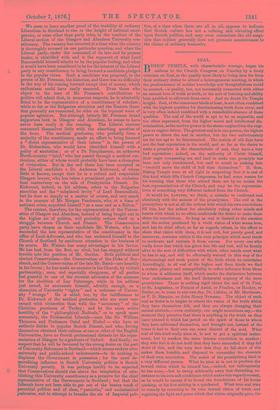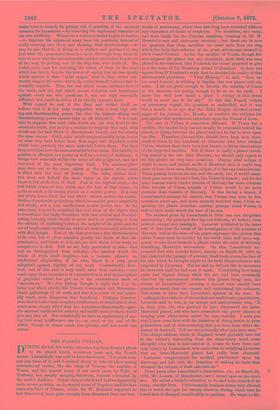ZEAL.
BISHOP TEMPLE, with characteristic courage, began his address to the Church Congress on Tuesday by a lively criticism on Zeal, as the quality most likely to bring men far from their ordinary duties to attend a heterogeneous meeting, in which the predominance of neither knowledge nor thoughtfulness could be secured,—a quality, too, not necessarily connected with either an earnest love of truth as truth, or the sort of learning and ability best qualified to sift truth from error. And no doubt Dr. Temple is right. Zeal, of the commoner kinds at least, is not often combined with the highest qualities for discriminating truth from error, and is very often indeed combined with a remarkable absence of these qualities. The zeal of the world is apt to be as separable, and too often separated, from the higher moral and intellectual dis- crimination, as the motive-power in the steam-engine from the engi- neer or engine-driver. The greatest zeal is in one person, the highest power to direct the zeal in another, but the two unfortunately are far too apt to be disconnected. The zealots of old days have not the best reputation in the world, and so far as the desire to make a proselyte is the characteristic of zeal, they have a very bad reputation ; indeed, on the authority of Christ himself, their eager compassing sea and land to make one proselyte has been not only condemned, but said to result in making him "twofold more the child of hell than themselves." If, then,
Bishop Temple were at all right in suspecting that it is zeal of this kind which fills Church Congresses, he had some reason for his warning that those who attend them are by no means the best representatives of the Church, and may be the representa- tives of something very different indeed from the Church.
It would be, however, we think, a mistake to confound zeal absolutely with the animus of the proselytiser. The evil in the proselytiser is not at all the ardour with which his own convictions fill him, but the ardour for absolutely ruling other minds and hearts with which he so often confounds the desire to make them share his convictions. So long as zeal is limited to the emotion and the action produced by a vivid vision of what seems true, and has its chief effect, so far as regards others, in the effort to share that vision with them, it is not evil, but purely good, and moreover, contains within it the very principle which most tends to moderate and restrain it from excess. For every one who really loves that which has given him life and rest, will be keenly alive to the sort of difficulties with which other minds meet what he has to say, and will be effectually warned in this way of the shortcomings and weak points of the faith which he entertains. Accordingly, in all zeal of the higher and finer kinds we find a certain pliancy and susceptibility to reflex influence from those to whom it addresses itself, which marks the distinction between true enthusiasm and the hard dictatorial urgency of the mere proselytiser. There is nothing rigid about the zeal of St. Paul, or St. Augustine, or Francis of ASSith, or Fenelon, or Hooker, or Butler, or, to come to our own day, Dr. Liddon, or Mr. Martineau, or F. D. Maurice, or John Henry Newman. The object of such zeal as theirs is to inspire in others the vision of the truth which they have themselves felt, and they are always changing._ their mental attitude,—even restlessly, one might sometimes say,—the moment they perceive that there is anything in the truth as they have uttered it which has jarred on the spirit of those to whom they have addressed themselves, and brought out, instead of the tones it had to their own ear, some discord of the soul. What zeal of this kind really aims at, is not to get a spiritual instru- ment, but to awaken the same intense conviction in another ; they who feel it do not hold that they have succeeded if they fall short of this, and the very fact that they do fall short of this makes them humble, and disposed to reconsider the elements of their own conviction. The zealot of the proselytising kind is a very different person. What he aims at is not to produce the inward vision which he himself has,—indeed, not unfrequently he has none,—but to sweep arbitrarily away that disturbing re- sistance to his own self-confidence which makes him vaguely uneasy, as he would be uneasy if he found the foundations of his house quaking, or his feet sinking in a quicksand. What true zeal tries to remedy by recurring to its own inward vision of truth, and regaining the light and peace which that vision originally gave, the
zealot tries to remedy by getting rid, if possible, of the external occasion for uneaainess,—by removing the unpleasant reminder of his own fallibility. Whenever a controversialist begins to hector, —to frighten his opponent away from his positions, instead of really entering into them and showing their shortcomings,—we may be sure that he is doing in a shallow and perfunctory way just what the persecutor does in a more thorough way, when he says at once that the uncomfortable opinion had better be put out of the way, by putting out of the way him who holds it. The zealot cares—not for restoring the vision of truth to the mind which has lost it, but for the power of saying that no one openly rebels against it, that "order reigns," that is, that others out- wardly respect the order which the zealot himself believes that he inwardly respects. Thus, the zeal which means intrinsic love of the truth, and the zeal which means iriitation and impatience against every one who questions it, are not only essentially different, but result in action of an utterly opposite kind.
Wfth regard to zeal of the finer and nobler kind, we believe that it is not only. compatible with a very high sift- ing and discriminating power, but that the highest sifting and discriminating power cannot exist at all without it. It is a mis- take to suppose that cold, calm minds are the best fitted to dis- criminate truth, just as it is a mistake to suppose that cold, calm minds are the best fitted to discriminate beauty, and for exactly the same reason. Cold, calm minds unquestionably judge better on what they have before them, than eager and impulsive minds which have precisely the same materials before them. But then they so seldom have the same materials before them. The liability to passion or affection is a power as well as a source of weakness ; it brings new materials within the scope of the judgment, and new materials of the most important kind. The common-place man does not see the same sights as the painter whose mind is filled with the love of beauty. The calm, critical intel- lect does not behold the same vision as the mystic whose heart is full of the love of God. Zeal in the highest sense,—the zeal which comes of true vision and the love of that vision,—is quite as much a discerning power as a motive power. It is only zeal of the lower kind, the zeal which cannot endure the contra- diction of particular prejudices, which is a motive power essentially and chiefly, and a very mischievous motive power, too. At the same time, it must be admitted that zeal even of the higher kind is sometimes but badly furnished with that critical and discrimi- nating learning which would be most useful in guarding it from the mistake of confusing between the insight of the spirit and the set of intellectual conclusions which are most commonly associated with that insight. Zeal of the best sort has a fine discrimination of its own, but it often mistakes greatly the limits of that dis- crimination, and trusts to it in spheres with which it has really no competence to deal. Still we are fully persuaded of this,—that zeal as distinguished from zealotry,—the passion which the vision of truth itself inspires,—has a humane pliancy, an intellectual adaptability of its own, which is a very great safeguard against bigotry of any kind. Undoubtedly, how- ever, zeal of this sort is very much rarer than zealotry,—very much rarer than impatience of contradiction in that special sphere of prejudice which has got on it the conventional mark of "sacredness." We fear Bishop Temple is right that it is the latter zeal which chiefly fills Church Congresses and Denomina- tional gatherings of all sorts, and that it is a sort of zeal gener- ally much more dangerous than beneficial. Perhaps, however, even that is better than complete indifference, to which zeal is often much more closely allied than the sometimes diametrically oppo- site external results which zealotry and indifference produce, would give any idea of. For occasionally we have an opportunity of see- ing how cruel indifference can be,—as cruel as the zeal of the zealot, though it seems much less gloomy, and has much less excuse.



































 Previous page
Previous page